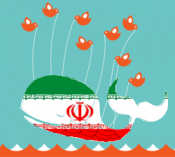 According to this report in the Wall Street Journal, the State Department asked Twitter to delay again a previously scheduled downtime on the service because of unfolding events in Iran. Twitter itself had delayed the first scheduled downtime. Twitter, however, ignored State’s request to delay the downtime again, cryptically noting in its blog that “the State Department does not have access to our decision making process.”
According to this report in the Wall Street Journal, the State Department asked Twitter to delay again a previously scheduled downtime on the service because of unfolding events in Iran. Twitter itself had delayed the first scheduled downtime. Twitter, however, ignored State’s request to delay the downtime again, cryptically noting in its blog that “the State Department does not have access to our decision making process.”
But where is the Department of Treasury’s Office of Foreign Assets Control (“OFAC”) in all of this? The current sanctions seem to prohibit California-based Twitter from providing its services to people in Tehran or anywhere else in Iran. The Twitter service sets up for each user a micro-blogging page that contains each of his or her “tweets.” This goes far beyond the narrow interpretation OFAC has of both the telecommunications exception and the information exception in its Iranian Transactions Regulations. Certainly if it is OFAC’s position that providing ISP services in Iran must be licensed, providing micro-blogging hosting services would require a license as well.
Don’t get me wrong: I am not advocating that OFAC rush in and shut down Twitter in Iran. But this instance shows the absurdity of applying comprehensive, rather than targeted sanctions, against Iran as well as the absurdity of OFAC’s narrow interpretations of the telecommunications and information exceptions. OFAC should define telecommunications services to cover all or most Internet-based services (including instant messaging, blog hosting, VOIP telephony). Similarly, the information exception should be broadened to include provision of any services by which information can be transmitted to or from Iran. Otherwise, OFAC’s regulations will have the unintended effect of supporting the Ahmadinejad regime’s goal of suppressing dissent in Iran.
One wonders whether OFAC and the State Department had any discussions about Twitter in Iran. And to be completely fair to OFAC, I’ve spoken informally with some people at the agency that are fully aware of, and concerned that, broad application of OFAC’s sanctions against private citizens in Iran might not be the best idea if it results in squelching the expression of dissenting views within the country.
Related ExportLawBlog Posts:
- U.S. Export Laws Block Access to Website on Crisis in Darfur
- On the Internet You Can Be From Anywhere You Want
- Web Host Uses OFAC Sanctions To Boot Dissident Bloggers
- Microsoft Shuts Off IM Service in Sudan and Other Sanctioned Countries
- It Wasn’t Me, I Swear
 Permalink
Permalink
Copyright © 2009 Clif Burns. All Rights Reserved.
(No republication, syndication or use permitted without my consent.)

 Posted by
Posted by  Category:
Category: 

